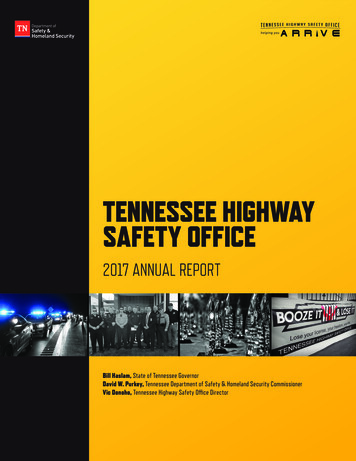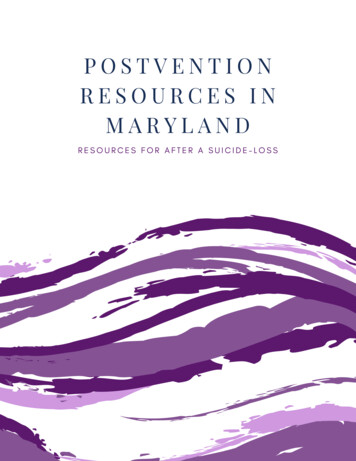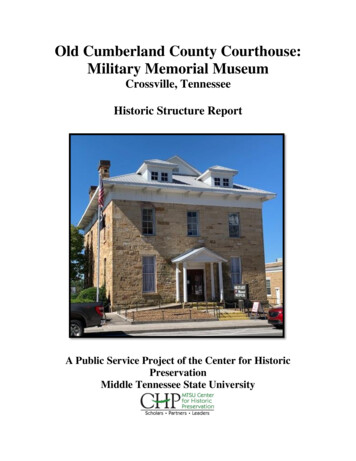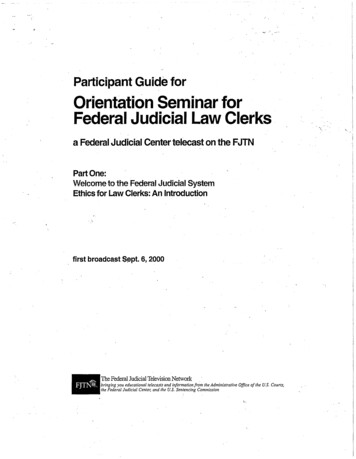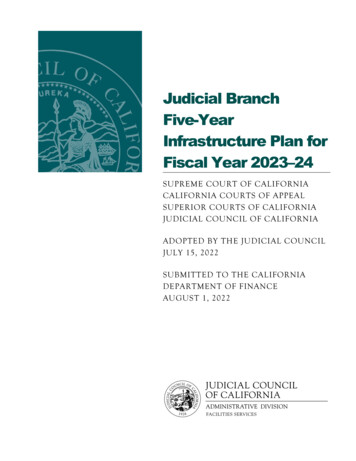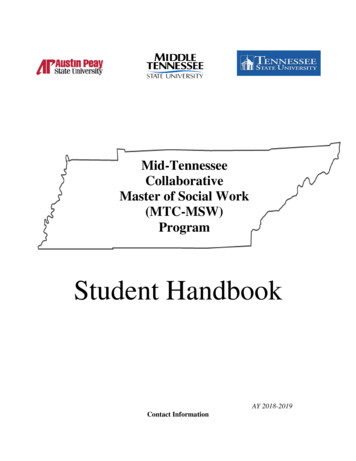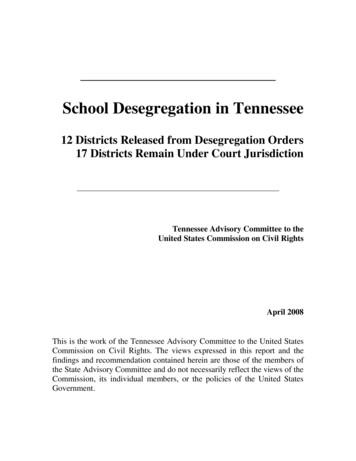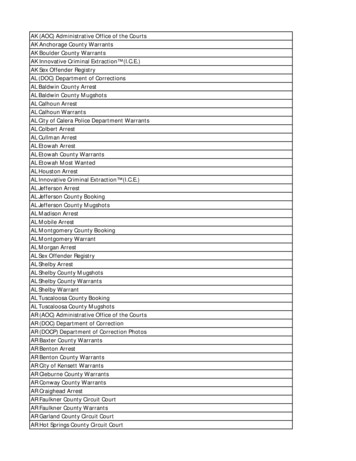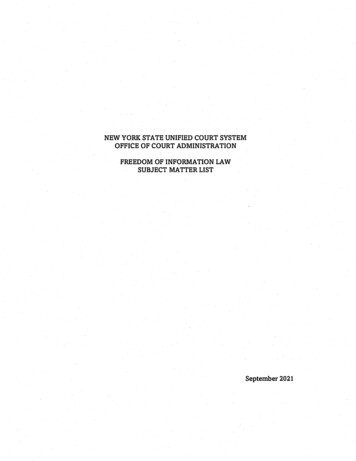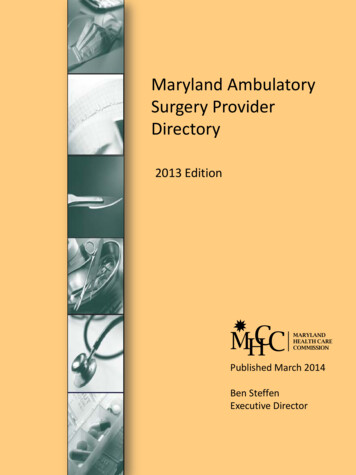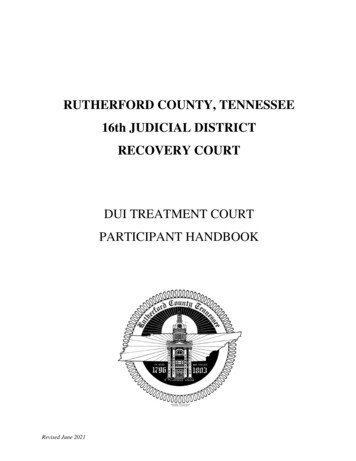
Transcription
RUTHERFORD COUNTY, TENNESSEE16th JUDICIAL DISTRICTRECOVERY COURTDUI TREATMENT COURTPARTICIPANT HANDBOOKRevised June 2021
WELCOME TO THE RECOVERY COURT PROGRAMThe DUI Treatment Court is committed to assisting individuals charged with a DUI 2nd (ormore) with intervention, treatment, and rehabilitation surrounding substance use disorders andcriminogenic thinking.This handbook will provide overall information about the DUI Treatment Court and what isexpected of you as a participant. You are encouraged to share this handbook with your familyand friends.DUI Court participants are responsible for following all the rules of the DUI Treatment Court,whether established by the court, treatment personnel, or supervision officers.If you have any questions not answered in this handbook, please call the Recovery CourtsDirector. The entire 16th Judicial District Recovery Courts Treatment Team supports you andyour efforts and will provide accountability and support.Sincerely,The DUI Treatment Court Team2
DUI COURT TEAMThe team meets weekly to review participants’ progress through the program. The following areactive members and their positions within the program:Judge:Lisa EischeidDistrict Attorney:Jerry BlythePublic Defender:Leslie A. McBrideProgram Director:Trish Breeding (615)217-7124 x1142Clinical Supervisor/Treatment Therapist:Janet Mattingly (615)217-7124 x1145Treatment Therapist:Amanda Mills (615)217-7124 x1154Alcohol & Drug Counselor:Marcus Jemison (615)217-7124 x1143Case Manager:Sami Behles (615)217-7124 x1144Law Enforcement:Lt. Richard T. Grissom (615) 904-3092Suicide Prevention Hotline:(800) 273-8255Mobile Crisis:Text “HELP” to 741741 or (855) 274-7471TN Redline:(800) 889-9789My Sponsor:3
TABLE OF CONTENTSINTRODUCTION TO DUI COURT . 6OFFICE ADDRESS & PHONE NUMBER . 6DUI TREATMENT COURT MISSION STATEMENT . 6DUI TREATMENT COURT PROGRAM DESCRIPTION . 6ELIGIBILITY REQUIREMENTS . 7COURT STATUS HEARINGS . 7JOURNAL ENTRIES . 7TREATMENT SERVICES . 8CASE MANAGEMENT . 8COUNSELING . 9RECOVERY COURT PROGRAM. 9PHASE ONE (1) . 9PHASE TWO (2) . 10PHASE THREE (3). 10PHASE FOUR (4) . 11COMMENCEMENT FROM DUI TREATMENT COURT . 11TERMINATION FROM DUI TREATMENT COURT. 12TELEPHONE POLICY . 12ATTENDANCE . 12TELEHEALTH POLICY . 13TRAVEL REQUESTS. 13HOUSING PLACEMENTS . 13HOME VISITS . 14TRANSPORTATION POLICY . 14SEARCH POLICY . 14CHILDCARE POLICY . 15RECOVERY-SUPPORT MEETINGS . 15WORK, COMMUNITY SERVICE AND/OR SCHOOL . 15FINANCIAL RESPONSIBILITIES . 154
DRUG TESTING. 16MEDICATION USE . 17MOOD-ALTERING SUBSTANCE POLICY . 18APPROVED “OVER THE COUNTER” MEDICATIONS . 18MEDICATION ASSISTED TREATMENT (MAT) . 19SANCTIONS AND INCENTIVES . 20PARTICIPANT RESPONSIBILITIES/RIGHTS . 21TITLE VI . 22RELEASES OF INFORMATION & CONFIDENTIALITY. 22GRIEVANCE PROCEDURES . 22CONCLUSION . 235
INTRODUCTION TO DUI COURTFirst and foremost, welcome to DUI Treatment Court. As a participant of DUI Court, you areexpected to follow the verbal instructions given to you in court by Judge Eischeid and thetreatment team. You will also be responsible for complying with the individualized treatmentplan developed specifically for you. This treatment plan will be developed by treatment staff atDUI Treatment Court with your input. This handbook will explain what is expected of you andprovide general program information. We encourage you to share this handbook with yourdirect support system so they will know about the work you are doing with the court.Support from those around you will be extremely important throughout your participationin the program.PLEASE NOTE THAT THE INFORMATION IN THIS HANDBOOK MAY CHANGEAS NEW MANDATES ARE RELEASED BY STATE AND FEDERAL REGULATORYAGENCIES, THE TREATMENT TEAM MAKES ADJUSTMENTS, OR FUNDINGCHANGES OCCUR.OFFICE ADDRESS & PHONE NUMBER525 North University StreetMurfreesboro, TN 37130Phone: (615) 217-7124Fax: (615) 217-7127HOURS OF Saturday:Sunday:8:00a – 4:30p8:00a – 4:30p8:00a – 4:30p8:00a – 4:30p8:00a – 4:30pClosedClosedTHE RECOVERY COURT OFFICE IS A TOBACCO AND SMOKE FREE FACILITY.YOU WILL NOT BE ALLOWED TO VAPE OR USE TOBACCO PRODUCTS INSIDETHE FACILITY.DUI TREATMENT COURT MISSION STATEMENTThe mission of the 16th JDRC program is to reduce the length and use of incarceration, reducethe recidivism rate of crimes related to substance abuse and improve the safety and quality of lifein our community by utilizing an innovative, efficient, integrated model of services.DUI TREATMENT COURT PROGRAM DESCRIPTIONThe DUI Treatment Court Program is designed to be a minimum of 12 months, consisting offour (4) phases; each phase having a minimum time to complete. Treatment may consist ofinpatient, residential, and outpatient treatment, or a combination of any of the above through ourprogram, and/or other available community resources. The four phases are designed to help6
break the pattern of substance abuse/dependency, address mental health issues and assist with reentry into the community.DUI Treatment Court is a VOLUNTARY program for its participants but requires approval ofthe prosecutor, defense counsel, the referring Judge and the DUI Treatment Court treatmentteam. While there are certain things that you must complete, your ability to progress through theprogram and graduate will depend greatly upon your actions. If you miss appointments, ignorecourt requirements, or fail to remain sober your time and participation in the program can beimpacted through delayed advancement through phases or possible termination.ELIGIBILITY REQUIREMENTSIndividuals may apply for the DUI Treatment Court at any time prior to sentencing. In addition,an otherwise eligible probationer who becomes subject to an application to revoke theirprobation may be eligible for admission. Individuals must have a minimum of twelve (12)months remaining on their probationary period in order to be eligible.Eligibility Requirements are as followed: Candidate must voluntarily agree to enter the DUI Treatment Court.Candidate must be eighteen (18) years or older.Candidate must reside within the 16th Judicial District.Candidate must not have violent charges that would make them ineligible.Candidate must self-report a history of substance abuseCandidate must be charged with a DUI 2nd or more.Candidate must have all legal matters in other courts and/or other jurisdictionsresolved.Candidate must score as moderate risk/moderate need on the TNRAS.COURT STATUS HEARINGSYour DUI Treatment Court status hearings are set on Tuesday at 9:00 a.m. unless rescheduledahead of time by the court. You will be given a calendar indicating the date and time you are toappear for court each month.Court status hearings give you a chance to discuss your progress in the program directly with theJudge. The Judge is interested in the progress that you are making and wants to assist you in anyway possible. It is still a court appearance, and you are expected dress appropriately, address theJudge respectfully and behave in a respectful manner during the entire proceeding.In the event of severe weather, closings will be announced on local television stations and radiostations. If the Rutherford County Courts are closed, there will be no DUI Treatment Court. Ifthe Rutherford County Government Offices are closed, the DUI Treatment Court office will beclosed.JOURNAL ENTRIESAt each court appearance all participants are required to submit a journal entry for theJudge to read. This journal entry should be a one-page summary of how you are doing inthe program. This journal entry is submitted to case management at court who then turns7
them over to the Judge. Journal entries are returned to case management the followingweek. Upon graduation, each participant receives their journal entries from the entiretyof their program.TREATMENT SERVICESThe DUI Treatment team will assess what level of treatment will best meet your needs and willdevelop an individualized treatment plan based on services available. The following services areavailable and may be provided to you during your participation in the program. Many of theseservices are provided in house, but others are the result of community partnerships with otherlocal agencies. Residential Intensive Inpatient TreatmentIntensive Outpatient Program (IOP)Supervised Transitional Housing ProgramsGroup TherapyIndividual Therapy SessionsRelapse Prevention Class (Matrix)Seeking Safety ClassRecovery Support Groups (AA/NA, etc)Moral Reconation Therapy (MRT)Cognitive Behavioral Therapy (CBT)Dialectical Behavioral Therapy (DBT)Occupational Therapy (OT)Eye Movement Desensitization and Reprocessing Therapy (EMDR)AcudetoxEmotional Freedom Technique (EFT)Sensory RegulationCouples and/or Family TherapyEquine TherapyLife Skills ClassMindfulnessAnger Management ClassYogaMental Health referral and follow up servicesNote: Treatment groups continue to be added as needs are presented and training is obtained.CASE MANAGEMENTYour case manager will be your primary point of contact during the program. It is important thatyou keep them informed of any changes in your contact information. Services made available byyour case manager include, but are not limited to, the following: Maintain contact with residential placementsHome visits and family contactsEnsure drug screening8
Verify all over the counter and prescribed medicationsVerify employment statusVerify financial obligationsPresent Phase Promotion to Treatment TeamConduct curfew checks (if assigned)Assist with budgets and schedulesAssist the participants in understanding legal issues such as child support,custodial issues and drivers’ licenses.Maintain contact with participants to ensure they are in compliance with theprogramAnnotate client notes to state level database.Communicate issues and concerns with Treatment TeamIs the primary person the participant is to maintain all contact with, and must beaware of what is happening in the participant’s daily lifeCOUNSELINGCounseling sessions are a required part of your treatment plan. Substance abuse and mentalhealth counseling is comprised of two separate formats: individual and group. Together they aredesigned to develop self-awareness, self-discipline, and coping mechanisms necessary tomaintain an individual’s sobriety and mental health. All participants are required to meet with atherapist individually upon admission into the program to assess the need for individual sessions.RECOVERY COURT PROGRAMThere are four (4) Core Phases of the DUI Treatment Court program that all participants shall adhere tountil completion. Trained staff will complete an ASAM on each participant at intake, in the event of arelapse, and upon discharge. It is essential that each participant presents with honest and opencommunication to better establish a foundation for recovery. It is also fundamental that each participantdemonstrates willingness to participate and utilize learned skills. Advancing in phase is done at thediscretion of the treatment team.*Time spent in jail will not count toward the minimum days in each phase. *PHASE ONE (1) is designed to last a minimum of sixty (60) days. Actual programtime will vary by participant. Phase One (1) includes, but is not limited to, the following: Meet with Case Manager in person weekly. Frequent & Random urine drug screens, minimum of twice weekly. Attend one (1) community/outside recovery support meeting per week. Attend group therapy as directed by individualized treatment plan. Bi-weekly court appearance Submit journal entry at each court appearance. Engage in individual therapy as deemed necessary. Set up a payment plan with the Criminal Court Clerk’s Office for fines, fees, andcourt costs. Engage in positive daily activity. This can be employment, schooling, orvolunteer work.9
Pay monthly program fees ( 50.00/mo.)To successfully complete Phase One, participants must have fourteen (14) consecutive daysof abstinence from all mood-altering substances. This is evidenced by negative urine drugscreens. Any non-negative and/or missed screens may result in an extension of the phase.Participants must also be in compliance with their individualized treatment plan and haveattended 90% of the required recovery support meetings.PHASE TWO (2) is designed to last a minimum of ninety (90) days. Actual programtime will vary by participant. Phase Two (2) includes, but is not limited to, thefollowing: Meet with Case Manager in person bi-weekly. Frequent & Random urine drug screens, minimum of twice weekly. Attend two (2) community/outside recovery support meetings per week. Obtain a Recovery Support Sponsor. Attend group therapy as directed by individualized treatment plan. Appear in court every three (3) weeks. Submit journal entry at each court appearance. Engage in individual therapy as deemed necessary. Continued compliance of payment plan with the Criminal Court Clerk’s Officefor fines, fees, and court costs. Engage in positive daily activity. This can be employment, schooling, orvolunteer work. Pay monthly program fees ( 50.00/mo.)To successfully complete Phase Two, participants must have thirty (30) consecutive days ofabstinence from all mood-altering substances This is evidenced by negative urine drug screens.Any non-negative and/or missed screens may result in an extension of the phase. Participantsmust also be in compliance with their individualized treatment plan and have attended 90% ofthe required recovery support meetings.PHASE THREE (3) is designed to last a minimum of ninety (90) days. Actual programtime will vary by participant. Phase Three (3) includes, but is not limited to, thefollowing: Meet with Case Manager in person bi-weekly. Frequent & Random urine drug screens, minimum of twice weekly. Attend two (2) community/outside recovery support meetings per week. Continue to engage with Recovery Support Sponsor. Attend group therapy as directed by individualized treatment plan. Appear in court every three (3) weeks. Submit journal entry at each court appearance. Engage in individual therapy as deemed necessary. Continued compliance of payment plan with the Criminal Court Clerk’s Officefor fines, fees, and court costs. Engage in positive daily activity. This can be employment, schooling, orvolunteer work.10
Pay monthly program fees ( 50.00/mo.)To successfully complete Phase Three, participants must have forty-five (45) consecutive days ofabstinence from all mood-altering substances. This is evidenced by negative urine drug screens.Any non-negative and/or missed screens may result in an extension of the phase. Participantsmust also be in compliance with their individualized treatment plan and have attended 90% ofthe required recovery support meetings.PHASE FOUR (4) is designed to last a minimum of one hundred twenty (120) days.Actual program time will vary by participant. Phase Four (4) includes, but is not limitedto, the following: Meet with Case Manager in person monthly. Frequent & Random urine drug screens, minimum of twice weekly. Attend two (2) community/outside recovery support meetings per week. Continue to engage with Recovery Support Sponsor. Meet with therapist and adhere to treatment plan. Attend group therapy as directed by individualized treatment plan. Appearance in court every four (4) weeks. Submit journal entry at each court appearance. Engage in individual therapy as deemed necessary. Continued compliance of payment plan with the Criminal Court Clerk’s Officefor fines, fees, and court costs. Engage in positive daily activity. This can be employment, schooling, orvolunteer work. Pay monthly program fees ( 50.00/mo.)To successfully complete Phase Four, participants must have three months (90 days) consecutivedays of abstinence from all mood-altering substances. This is evidenced by negative urine drugscreens. Any non-negative and/or missed screens may result in an extension of the phase.Participants must also be in compliance with their individualized treatment plan and haveattended 90% of the required recovery support meetings.COMMENCEMENT FROM DUI TREATMENT COURTPrior to the completion of Phase Four (4) the participant will be presented to the Treatment Team todiscuss eligibility for Graduation/Commencement. Prior to this, the participant will complete aGraduation Questionnaire and return to their Case Manager.The DUI Treatment Court will hold a commencement ceremony to honor those who have successfullycompleted the program. The purpose of this celebration is to recognize the commitment each graduatehas made to themselves, their family, and their community. The participant will be encouraged toparticipate in the group graduation but will not be required to make any public statements regarding theprogram. The participant will not be required to perform in public gatherings or have photographs usedwithout their written consent.11
Successful completion of the DUI Treatment Court may result in a reduction of court costs, fines, andfees, the dismissal of criminal charges, or a reduction in the terms of the graduate’s probation period.This is a decision that is dependent upon the originating Judge.TERMINATION FROM DUI TREATMENT COURTThe DUI Treatment Court is a voluntary program. A participant may voluntarily terminate theirparticipation in the program at any time. The participant should inform their Case Manager of theirdecision to exit the program and the Case Manager will present the information to the Treatment Team.This will result in the participant returning to their court of origin for a due process hearing or theimposition of the sentence associated with their charges.Outside of self-termination, participants in the DUI Treatment Court can be terminated as a TreatmentTeam decision as carried out by the Judge. The following situations may result in termination. Participant has continually failed to follow the rules of the DUI Treatment Court. Participant attempts to adulterate a urine drug screen. Participant needs are outside the scope of services provided at the DUI Court. Participant is re-arrested for new criminal charges while in the program. Participant knowingly involves another participant in prohibited actions. Participant enters a sexual/romantic relationship with another 16th JDRC participant. Participant absconds.TELEPHONE POLICYDUI Treatment Court Participants must have a telephone (or cell phone) at the client’s place ofresidence to participate in the program. While clients are residing at a transitional housing, theyare to follow the house rules. Therefore, if the placement house has a restriction on cell phonesthe phone number for the placement house is the contact number for the client. If client does nothave a phone, the DUI Treatment Team reserves the right to require electronic monitoring atparticipant’s expense.ATTENDANCEAttendance at court sessions, treatment sessions, mental health appointments, and supportrecovery meetings is mandatory! You will be assigned a weekly group and will be expected toattend every group. Excused absences are the exception, not the rule. Occasionally, participantsmay be granted excused absences from court, treatment, or other scheduled appointments for thefollowing reasons: Severe medical emergenciesOther court obligationsIllness (must have a doctor’s note)Death in your immediate familyUnless you are proven unconscious, you must call your case manager prior to seeking treatmentfor any medical emergency, and proof of the emergency must be given for an absence to beexcused after non-attendance. In cases of non-emergency illnesses, you must report to theoffice/meeting first and request to be excused.12
In the event of a death in your immediate family, you must call your case manager or treatmentcounselor. Proof may be required and if so, a copy of the obituary or some other form ofinformation can be provided. Unexcused absences may result in a sanction if the judge decides itis necessary.TELEHEALTH POLICYIf attendance of court, treatment sessions or case management appointments is not an option dueto illness, medical quarantine, or death of an immediate family member, participants may beasked to report via teleservices. DUI Treatment Court is set up to utilize a HIPAA compliantplatform which allow the privacy of all participants. When utilizing teleservices, participantsshould ensure that they are in a private setting where others cannot overhear. It is recommendedthat headphones are utilized. During telehealth sessions, participants should be fully clothed andadhere to the same guidelines as if in person at the 16th JDRC facility.TRAVEL REQUESTSParticipants may submit a leave request, in writing, for the team to consider once they enterPhase 2. Travel is a privilege and is allowed at the discretion of the treatment team. The DUITreatment Team must approve the leave request prior to leave being taken and the followingconditions must apply: You must be in Phase 2 (or above) of the DUI Treatment Court Program.You are only allowed two (2) approved travel requests per year.You must attend support recovery meetings during, before and/or after your leavedepending on the details of the request.You must have an important reason for the leave request.You must have approval from the DUI Court before taking leave.You must submit the request 14 days prior to travel. This provides ample time for theteam to discuss it prior to the date of the requested leave.You must be in compliance with the DUI Court.If you are under the supervision of another agency, you must also be in good standingwith that agency and have their approval.You must report for a drug screen the day prior to leaving and upon your return.*You are advised not to make reservations of any sort until you have been informed that yourTravel Request has been approved. *ANY VIOLATION OF THE TERMS OF YOUR TRAVEL PASS, MAY RESULT INFUTURE TRAVEL REQUESTS BEING DENIED.HOUSING PLACEMENTSPlacements are NOT punishment. They are used to give support for recovery and a safeenvironment to help with your transition. You may be required to live in a supported transitionalhousing placement if: You do not have a stable, supportive home to go to after your jail release.13
People living in your home use illegal drugs and are under the supervision of thecourt or other legal issues are present.People living in your home are not equipped to assist you with the people, places andthings that need to change.You need more structure and accountability.You request it.The DUI Court Treatment Team determines it is in your best interest.During your stay at placements, you must: Follow all the rules of the placement and DUI Court.Apply to the DUI Court Treatment Team for any overnight or weekend passes. Youmust be in Phase 2 or above and complete a Travel Request Form with your CaseManager.Attend DUI Court status hearings, as scheduled, unless other arrangements are madeby our placement and case manager.Attend DUI Court classes as scheduled.Complete a transitional-living plan with the placement and your case manager beforeleaving.Submit to all drug screens required of the housing placement and the DUI Courtprogram.Engage in treatment and maintain compliance.HOME VISITSDUI Court staff may visit you at your home or place of employment. Home visits may berandom. Therefore, it is imperative that the address and phone number provided to the 16thJDRC are accurate.TRANSPORTATION POLICYParticipants must arrange transportation in advance for office visits, treatment, and court. TheDUI Court staff does not have the ability to be the primary mode of transportation. Iftransportation becomes an issue, you shall immediately notify your case manager so that allsolutions can be examined. If you have a license and will be driving, you will be required tohave an interlock device on your car within thirty (30) days of entry into the program.SEARCH POLICYParticipants of the DUI Court program are subject to random searches for the protection andsafety of staff and fellow participants. Searches may be conducted if there is reasonablesuspicion of illegal activity or safety concerns. Search methods may include pat searches(conducted by same sex staff members,) automobile search, or no-contact search of participantand/or their personal property.Participants of the 16th JDRC voluntarily consent to allow the staff to search their person,automobile, or residence at any time without a warrant. This search will be for the purpose ofensuring compliance with the agreement made with the DUI Treatment Court and may beconducted without probable cause.Any contraband that is discovered during the search may be confiscated by staff.14
CHILDCARE POLICYThe 16th JDRC does not currently provide childcare services to participants. The DUI Courtstaff will assist all participants in locating and obtaining adequate childcare services to allow forfull participation in the Recovery Court program. In instances where childcare falls through, theparticipant is responsible for contacting their Case Manager to make arrangements for anymissed treatment sessions prior to the class.RECOVERY-SUPPORT MEETINGSRecovery-support meetings, such as Alcoholics Anonymous (AA), Narcotics Anonymous (NA),or other similar DUI Court -approved programs are required. There is a variety of meetings inthe county. Your Case Manager has a list of locations, meeting dates, and times. You may pickwhich ones you would like to attend. How many meetings you are required to attend each weekdepends on what program phase you are in, your treatment plan and on the discretion of yourCase Manager and/or the DUI Court Treatment Team. Obtaining and working with a sponsor ispart of this requirement. At the meetings you need to: Be honestListen to others and be respectfulFind a Sponsor (as required)Gain additional support for your recoveryMaintain confidentialityWORK, COMMUNITY SERVICE AND/OR SCHOOLAs part of the DUI Court Program, you are required to: Maintain gainful employment and/orComplete community servi
DUI TREATMENT COURT PROGRAM DESCRIPTION The DUI Treatment Court Program is designed to be a minimum of 12 months, consisting of four (4) phases; each phase having a minimum time to complete. Treatment may consist of inpatient, residential, and outpatient treatment, or a combination of any of the above through our program, and/or other available .
